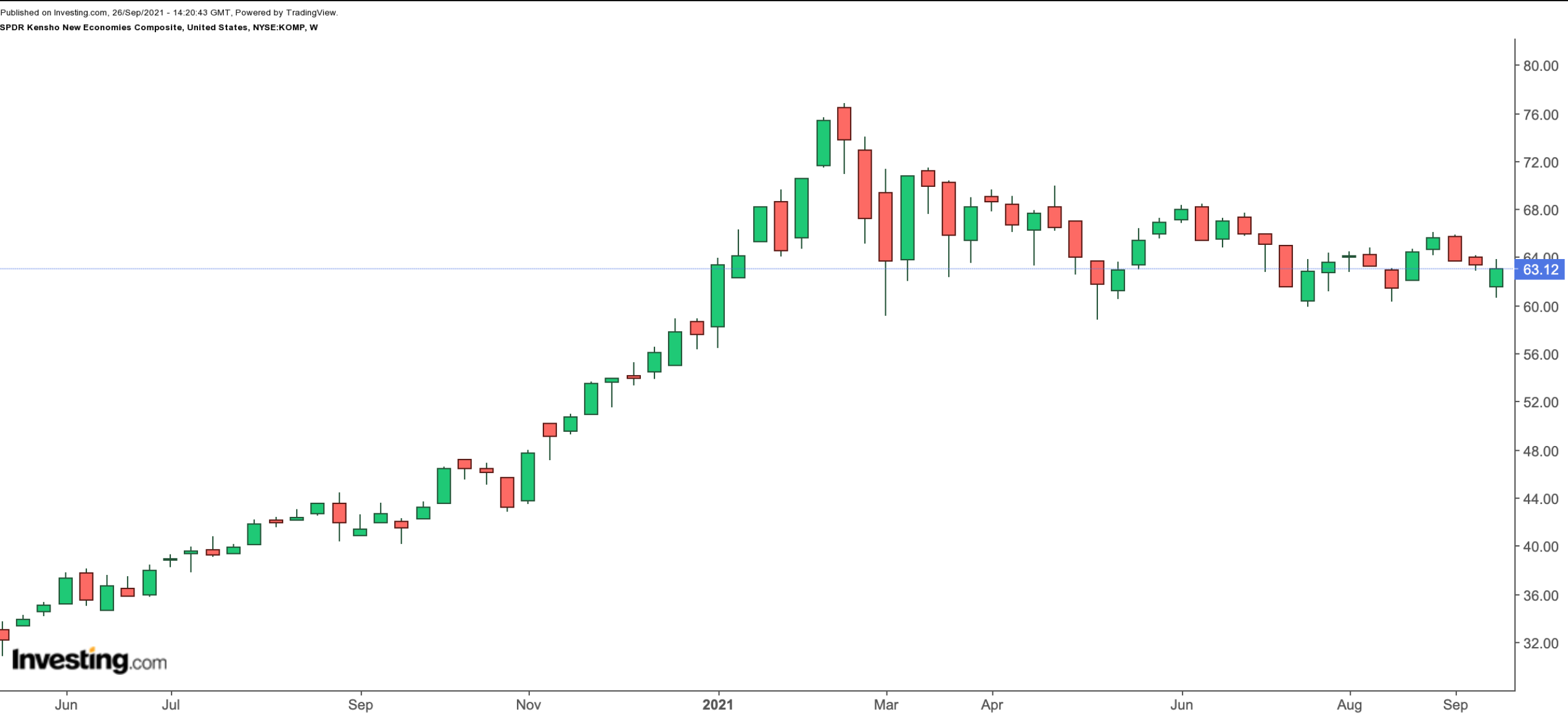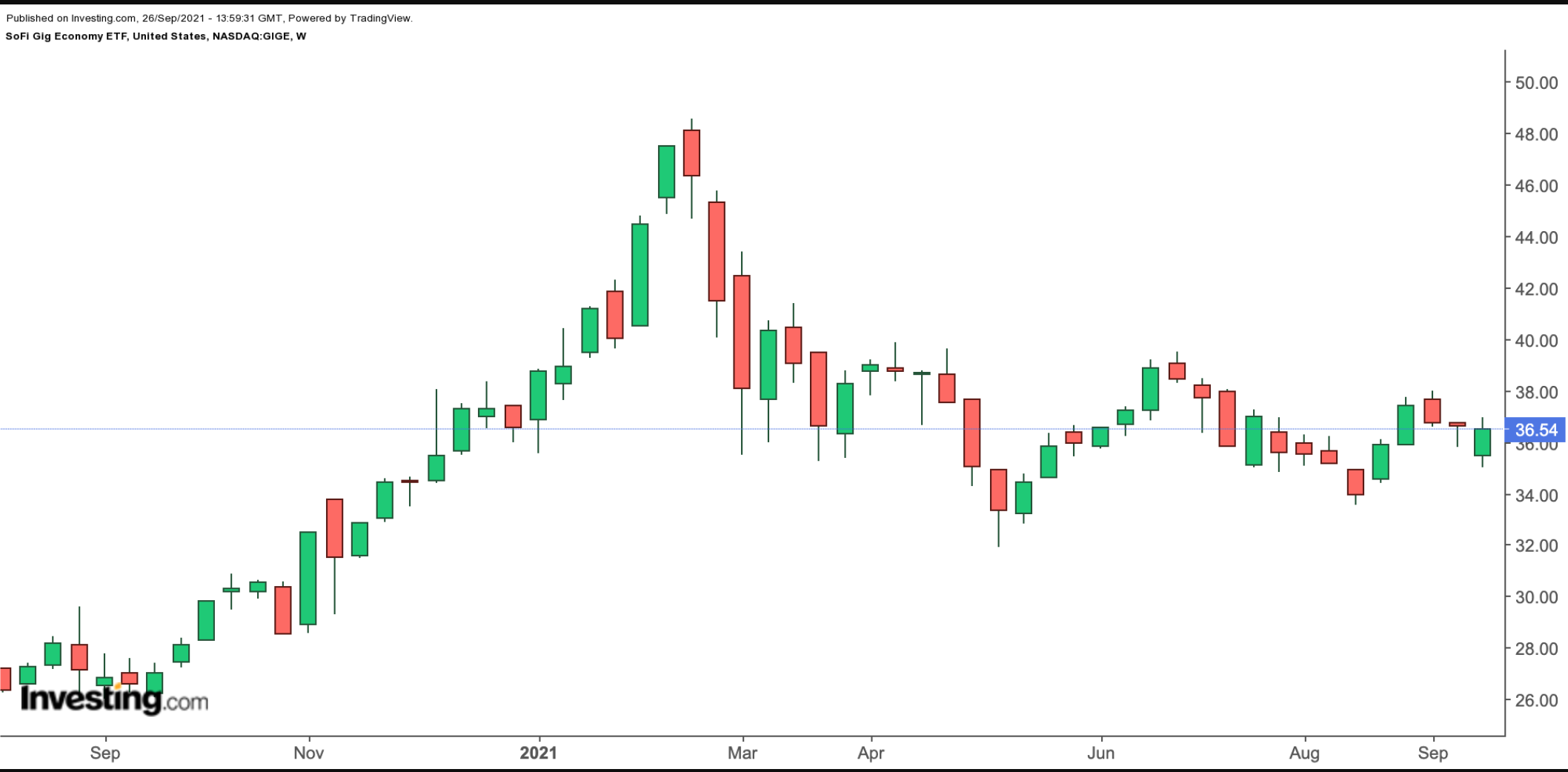The SPDR® S&P 500 ETF (NYSE:SPY) was the first exchange-traded fund launched in the US in January 1993. Since then the number of funds and assets under management have grown significantly.
Metrics highlight in 2003 there were 276 ETFs stateside. At the end of 2020, the number reached 7,602. And according to numbers from the research and consultancy group ETFGI, the first half of 2021 saw “record assets and net inflows in Active ETFs world-wide of US$400.77 billion and US$82.23 billion.”
There are of course different types of ETFs, focusing on various asset classes or investment styles. A large number of funds are passive equity ETFs that track the returns of widely followed stock market benchmarks such as the Dow Jones Industrial Average, the S&P 500 or the NASDAQ 100.
Yet, a growing numbers of ETFs are niche funds that offer exposure to specific themes. For instance several niche technology funds offer a narrow focus to sub-segments of the tech sector. Examples include ETFs that provide access to artificial intelligence (AI), blockchain, cybersecurity, e-commerce, financial technology (fintech), or robotics focused companies.
We should note that the US Securities and Exchange Commission (SEC) reminds investors:
“Certain ETFs can be relatively easy to understand. Other ETFs may have unusual investment objectives or use complex investment strategies that may be more difficult to understand and fit into an investor’s investment portfolio.”
Put another way, retail investors need to do due diligence to see if a given fund is appropriate for their investment objectives and horizons. With that in mind, here are two sector specific ETFs that might be worth a look.
1. SPDR S&P Kensho New Economies Composite ETF
- Current Price: $63.12
- 52-Week Range: $40.09 - $76.76
- Dividend Yield: 1.10%
- Expense Ratio: 0.20% per year
The SPDR Kensho New Economies Composite Fund (NYSE:KOMP) invests in innovative business whose products and services are transforming economies via developments in technology, such as AI, automation, computer processing power, connectedness, and robotics.

KOMP, which has 491 holdings, tracks the returns of the S&P Kensho New Economies Composite Index. The fund started trading in October 2018.
In terms of the sub-sectoral breakdown, the Application Software sector makes up the highest portion with 8.35%, followed by the Aerospace & Defense (7.49%), Semiconductors (6.77%) and Healthcare Equipment (6.14%). The top 10 holding account for about 11% of net assets of $2.08 billion.
Scientific instrument manufacturer Bruker (NASDAQ:BRKR); aerospace and defense electronics group Teledyne Technologies (NYSE:TDY); AI lending platform Upstart (NASDAQ:UPST); Ambarella (NASDAQ:AMBA), which manufactures image processing semiconductors; and additive electronics provider Nano Dimension (NASDAQ:NNDM) lead the names in the roster.
Over the past year, the fund is up about 55% and returned 9.5% year-to-date (YTD). The fund saw an all-time-high (ATH) of $76.76 in mid-February.
Since then many of the names in the ETF have come under pressure. Its trailing P/E and P/B ratios are 19.96x and 3.07x. We like the diversity of the fund. Interested readers could find value around these levels.
2. SoFi Gig Economy ETF
- Current Price: $36.54
- 52-Week Range: $26.21 - $48.58
- Dividend Yield: 0.34%
- Expense Ratio: 0.59% per year
Our second fund, the SoFi Gig Economy ETF (NASDAQ:GIGE), invests in global businesses that are part of the “gig” economy. The US Bureau of Labor Statistics (BLS) defines a gig as “a single project or task for which a worker is hired, often through a digital marketplace, to work on demand.”
And the World Economic Forum suggests:
“The gig economy uses digital platforms to connect freelancers with customers to provide short-term services or asset-sharing. Examples include ride-hailing apps, food delivery apps, and holiday rental apps… It’s a growing segment, bringing economic benefits of productivity and employment. But it also raises questions about levels of consumer and worker protection.”

GIGE, which has 71 holdings, tracks the returns of the ATFI Global NextGen Fintech Index. The fund first started trading in May 2019, and has around $34.5 million in assets.
About 52% of the businesses come from the US. Next in line are those based in China (18.1%), Canada (6.4%), Sweden (2.9%), Singapore (2.8%), among others.
In terms of the sub-sectoral breakdown, the Communications sector makes up the highest portion with 53.9%, followed by the Technologies and Consumer Non-cyclical sectors with 24.5% and 12.9%, respectively. The leading 10 stocks comprise about 31% of assets.
Among the top holdings are the online employment marketplace Upwork (NASDAQ:UPWK), multichannel e-commerce heavyweight Shopify (NYSE:SHOP), commerce ecosystem and fintech name Square (NYSE:SQ), social media platform Twitter (NYSE:TWTR), and Airbnb (NASDAQ:ABNB), the platform which connects travelers with local hosts.
Over the past 12 months, the fund is up about 38%, but flat this year. GIGE also hit a record high in mid-February. But since then, the ETF has lost about 25% of its value. The pandemic meant rapid growth for many names in the platform economy.
However, the opening of economies worldwide has led to profit-taking in a large number of these high growth stocks. Potential buy-and-hold investors could regard any further decline toward $35 as opportunity to invest for the long term.
